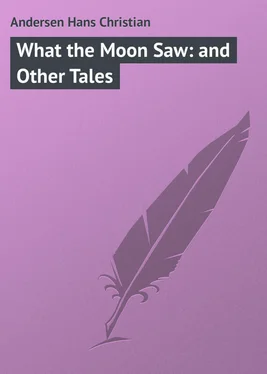Andersen Hans - What the Moon Saw - and Other Tales
Здесь есть возможность читать онлайн «Andersen Hans - What the Moon Saw - and Other Tales» — ознакомительный отрывок электронной книги совершенно бесплатно, а после прочтения отрывка купить полную версию. В некоторых случаях можно слушать аудио, скачать через торрент в формате fb2 и присутствует краткое содержание. Жанр: foreign_prose, на английском языке. Описание произведения, (предисловие) а так же отзывы посетителей доступны на портале библиотеки ЛибКат.
- Название:What the Moon Saw: and Other Tales
- Автор:
- Жанр:
- Год:неизвестен
- ISBN:нет данных
- Рейтинг книги:5 / 5. Голосов: 1
-
Избранное:Добавить в избранное
- Отзывы:
-
Ваша оценка:
- 100
- 1
- 2
- 3
- 4
- 5
What the Moon Saw: and Other Tales: краткое содержание, описание и аннотация
Предлагаем к чтению аннотацию, описание, краткое содержание или предисловие (зависит от того, что написал сам автор книги «What the Moon Saw: and Other Tales»). Если вы не нашли необходимую информацию о книге — напишите в комментариях, мы постараемся отыскать её.
What the Moon Saw: and Other Tales — читать онлайн ознакомительный отрывок
Ниже представлен текст книги, разбитый по страницам. Система сохранения места последней прочитанной страницы, позволяет с удобством читать онлайн бесплатно книгу «What the Moon Saw: and Other Tales», без необходимости каждый раз заново искать на чём Вы остановились. Поставьте закладку, и сможете в любой момент перейти на страницу, на которой закончили чтение.
Интервал:
Закладка:
But in the middle of the night the goblin was awaked by a terrible tumult and beating against the window shutters. People rapped noisily without, and the watchman blew his horn, for a great fire had broken out – the whole street was full of smoke and flame. Was it in the house itself, or at a neighbour's? Where was it? Terror seized on all. The huckster's wife was so bewildered that she took her gold earrings out of her ears and put them in her pocket, that at any rate she might save something; the huckster ran for his share-papers; and the maid for her black silk mantilla, for she had found means to purchase one. Each one wanted to save the best thing they had; the goblin wanted to do the same thing, and in a few leaps he was up the stairs, and into the room of the student, who stood quite quietly at the open window, looking at the conflagration that was raging in the house of the neighbour opposite. The goblin seized upon the wonderful book which lay upon the table, popped it into his red cap, and held the cap tight with both hands. The great treasure of the house was saved; and now he ran up and away, quite on to the roof of the house, on to the chimney. There he sat, illuminated by the flames of the burning house opposite, both hands pressed tightly over his cap, in which the treasure lay; and now he knew the real feelings of his heart, and knew to whom it really belonged. But when the fire was extinguished, and the goblin could think calmly again, why, then…
"I must divide myself between the two," he said; "I can't quite give up the huckster, because of the porridge!"
Now, that was spoken quite like a human creature. We all of us visit the huckster for the sake of the porridge.
IN A THOUSAND YEARS
Yes, in a thousand years people will fly on the wings of steam through the air, over the ocean! The young inhabitants of America will become visitors of old Europe. They will come over to see the monuments and the great cities, which will then be in ruins, just as we in our time make pilgrimages to the tottering splendours of Southern Asia. In a thousand years they will come!
The Thames, the Danube, and the Rhine still roll their course, Mont Blanc stands firm with its snow-capped summit, and the Northern Lights gleam over the lands of the North; but generation after generation has become dust, whole rows of the mighty of the moment are forgotten, like those who already slumber under the hill on which the rich trader whose ground it is has built a bench, on which he can sit and look out across his waving corn-fields.
"To Europe!" cry the young sons of America; "to the land of our ancestors, the glorious land of monuments and fancy – to Europe!"
The ship of the air comes. It is crowded with passengers, for the transit is quicker than by sea. The electro-magnetic wire under the ocean has already telegraphed the number of the aërial caravan. Europe is in sight: it is the coast of Ireland that they see, but the passengers are still asleep; they will not be called till they are exactly over England. There they will first step on European shore, in the land of Shakespeare as the educated call it; in the land of politics, the land of machines, as it is called by others.
Here they stay a whole day. That is all the time the busy race can devote to the whole of England and Scotland. Then the journey is continued through the tunnel under the English Channel, to France, the land of Charlemagne and Napoleon. Moliere is named: the learned men talk of the classic school of remote antiquity: there is rejoicing and shouting for the names of heroes, poets, and men of science, whom our time does not know, but who will be born after our time in Paris, the crater of Europe.
The air steamboat flies over the country whence Columbus went forth, where Cortez was born, and where Calderon sang dramas in sounding verse. Beautiful black-eyed women live still in the blooming valleys, and the oldest songs speak of the Cid and the Alhambra.
Then through the air, over the sea, to Italy, where once lay old, everlasting Rome. It has vanished! The Campagna lies desert: a single ruined wall is shown as the remains of St. Peter's, but there is a doubt if this ruin be genuine.
Next to Greece, to sleep a night in the grand hotel at the top of Mount Olympus, to say that they have been there; and the journey is continued to the Bosphorus, to rest there a few hours, and see the place where Byzantium lay; and where the legend tells that the harem stood in the time of the Turks, poor fishermen are now spreading their nets.
Over the remains of mighty cities on the broad Danube, cities which we in our time know not, the travellers pass; but here and there, on the rich sites of those that time shall bring forth, the caravan sometimes descends, and departs thence again.
Down below lies Germany, that was once covered with a close net of railways and canals, the region where Luther spoke, where Goëthe sang, and Mozart once held the sceptre of harmony! Great names shine there, in science and in art, names that are unknown to us. One day devoted to seeing Germany, and one for the North, the country of Oersted and Linnæus, and for Norway, the land of the old heroes and the young Normans. Iceland is visited on the journey home: the geysers burn no more, Hecla is an extinct volcano, but the rocky island is still fixed in the midst of the foaming sea, a continual monument of legend and poetry.
"There is really a great deal to be seen in Europe," says the young American, "and we have seen it in a week, according to the directions of the great traveller" (and here he mentions the name of one of his contemporaries) "in his celebrated work, 'How to See all Europe in a Week.'"
THE BOND OF FRIENDSHIP
We have just taken a little journey, and already we want to take a longer one. Whither? To Sparta, to Mycene, to Delphi? There are a hundred places at whose names the heart beats with the desire of travel. On horseback we go up the mountain paths, through brake and through brier. A single traveller makes an appearance like a whole caravan. He rides forward with his guide, a pack-horse carries trunks, a tent, and provisions, and a few armed soldiers follow as a guard. No inn with warm beds awaits him at the end of his tiring day's journey: the tent is often his dwelling-place. In the great wild region the guide cooks him a pillan of rice, fowls, and curry for his supper. A thousand gnats swarm round the tent. It is a boisterous night, and to-morrow the way will lead across swollen streams; take care you are not washed away!
What is your reward for undergoing these hardships? The fullest, richest reward. Nature manifests herself here in all her greatness; every spot is historical, and the eye and the thoughts are alike delighted. The poet may sing it, the painter portray it in rich pictures; but the air of reality which sinks deep into the soul of the spectator, and remains there, neither painter nor poet can produce.
In many little sketches I have endeavoured to give an idea of a small part of Athens and its environs; but how colourless the picture seems! How little does it exhibit Greece, the mourning genius of beauty, whose greatness and whose sorrow the stranger never forgets!
The lonely herdsman yonder on the hills would, perhaps, by a simple recital of an event in his life, better enlighten the stranger who wishes in a few features to behold the land of the Hellenes, than any picture could do.
"Then," says my Muse, "let him speak." A custom, a good, peculiar custom, shall be the subject of the mountain shepherd's tale. It is called
Our rude house was put together of clay; but the door-posts were columns of fluted marble found near the spot where the house was erected. The roof reached almost down to the ground. It was now dark brown and ugly, but it had originally consisted of blooming olive and fresh laurel branches brought from beyond the mountain. Around our dwelling was a narrow gorge, whose walls of rock rose steeply upwards, and showed naked and black, and round their summits often hung clouds, like white living figures. Never did I hear a singing bird there, never did the men there dance to the sound of the bagpipe; but the spot was sacred from the old times: even its name reminded of this, for it was called Delphi! The dark solemn mountains were all covered with snow; the highest, which gleamed the longest in the red light of evening, was Parnassus; the brook which rolled from it near our house was once sacred also. Now the ass sullies it with its feet, but the stream rolls on and on, and becomes clear again. How I can remember every spot in the deep holy solitude! In the midst of the hut a fire was kindled, and when the hot ashes lay there red and glowing, the bread was baked in them. When the snow was piled so high around our hut as almost to hide it, my mother appeared most cheerful: then she would hold my head between her hands, and sing the songs she never sang at other times, for the Turks our masters would not allow it. She sang:
Читать дальшеИнтервал:
Закладка:
Похожие книги на «What the Moon Saw: and Other Tales»
Представляем Вашему вниманию похожие книги на «What the Moon Saw: and Other Tales» списком для выбора. Мы отобрали схожую по названию и смыслу литературу в надежде предоставить читателям больше вариантов отыскать новые, интересные, ещё непрочитанные произведения.
Обсуждение, отзывы о книге «What the Moon Saw: and Other Tales» и просто собственные мнения читателей. Оставьте ваши комментарии, напишите, что Вы думаете о произведении, его смысле или главных героях. Укажите что конкретно понравилось, а что нет, и почему Вы так считаете.












